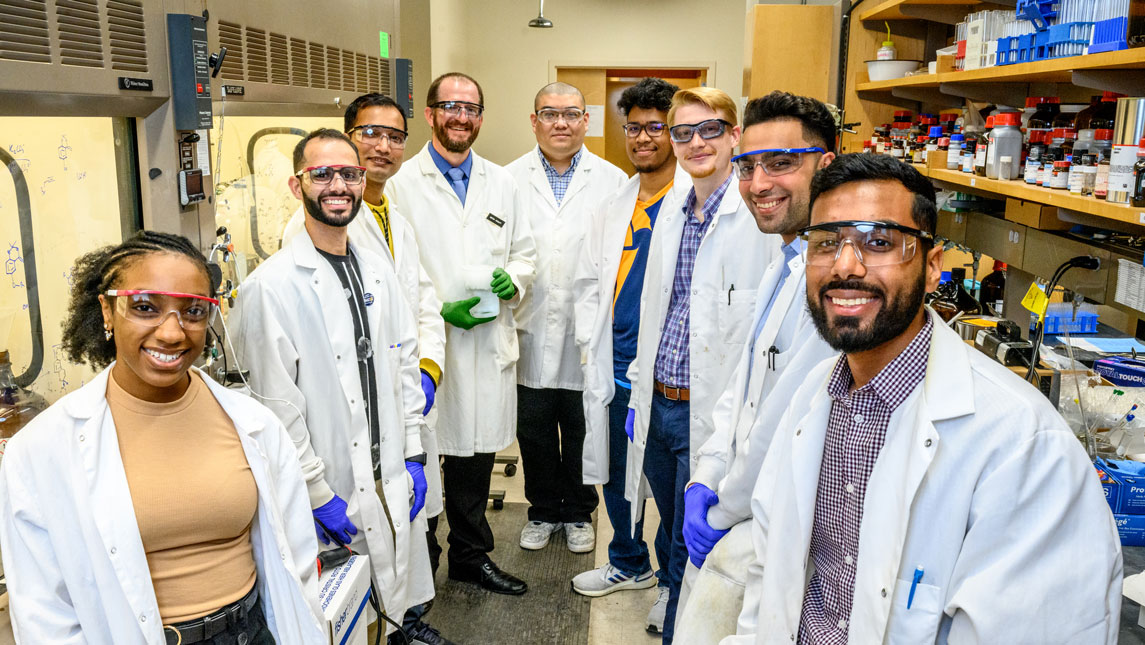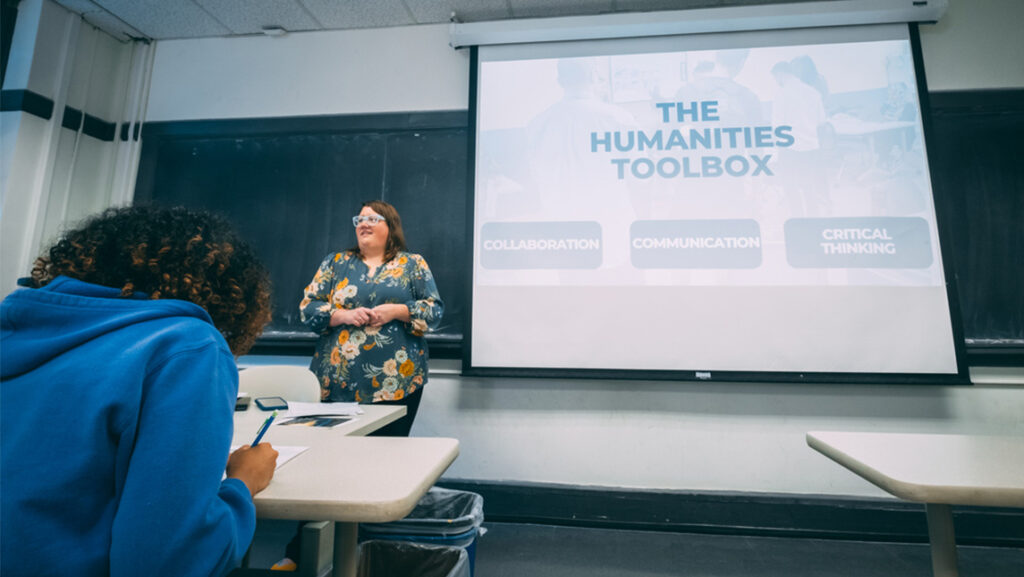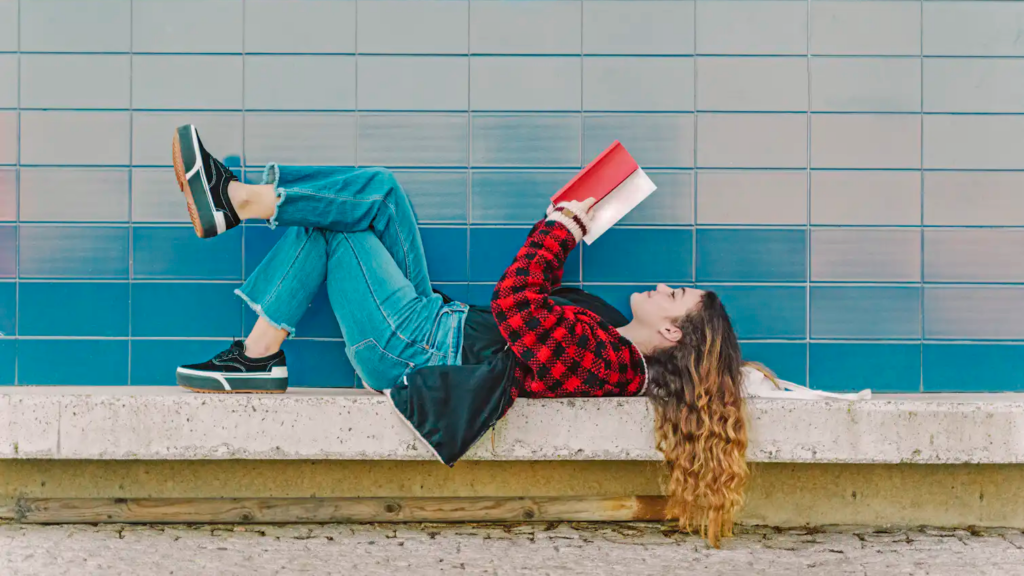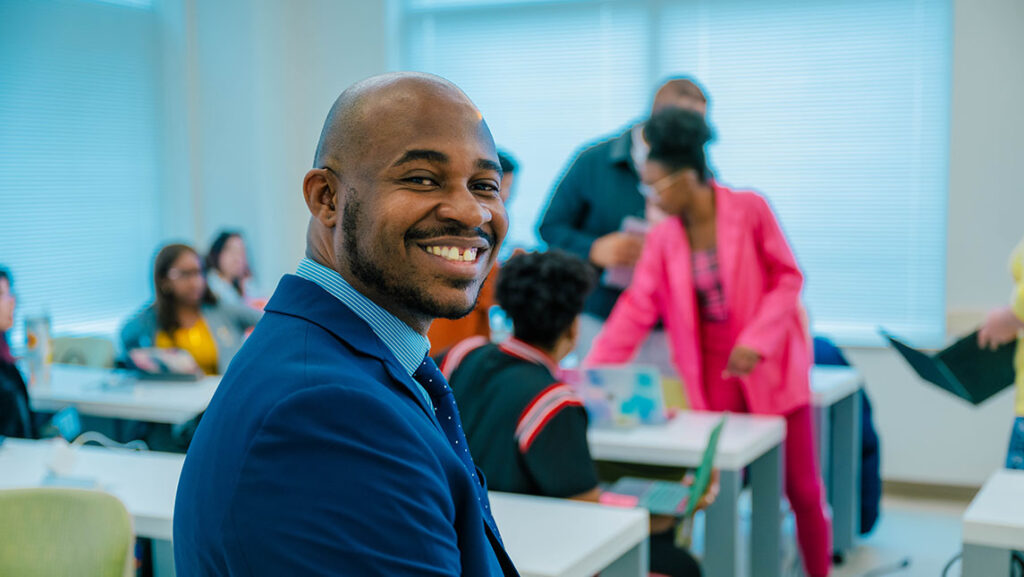Dr. Mitch Croatt has a theory about his lab group, and it fits right into that Spartan spirit at UNC Greensboro.
“The relationships that develop in a lab are similar to those on a sports team, where everyone helps one another and a success for one is a success for all,” he says. “They bond like a team and have healthy competitions to push one another to become better. I view myself as the coach of the team whose role is to both train and educate the players.”
The head of the UNCG’s Department of Chemistry and Biochemistry was named Marie Foscue Rourk Distinguished Professor this past school year. His accomplishments in research are numerous, including more than $3 million in federal research funding, but it’s not only that which distinguishes him. It’s his work with students – teaching them, mentoring them, and helping them grow through research and collaboration in the lab, even during difficult pandemic years – that makes him exceptional, but also a true Spartan, a professor who demonstrates the type of caring you can only find at UNCG.
“Mentoring students in my research lab is one of the most fulfilling parts of my job,” he says. “I know that undergraduate research absolutely changed the trajectory of my own career and life. Graduate students and postdocs also have their futures molded by what they accomplish and learn while in the lab. The researchers that I currently have are very unique. A few of them joined before COVID and had to weather the storm of closing the lab and doing a slow reopening. They managed virtual group meetings for a year, and I think that they bonded more tightly during that time. They are a strong cohort that has developed strong relationships within that group.”
The Line-up
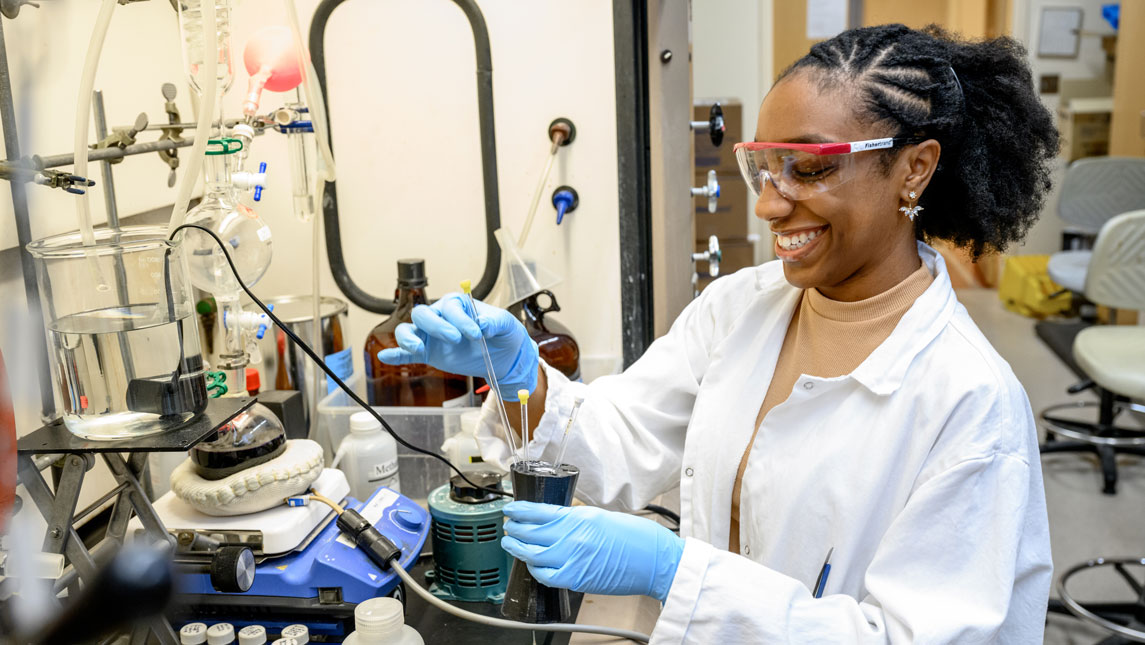
Tangela Johnson ’21 is a first-year masters student in chemistry with a concentration in biochemistry. She returned to UNCG as a graduate student after earning her undergraduate degree, also in chemistry, in 2021. She is currently working on “Analysis of the aromatic Claisen rearrangement.”
About the lab environment: “There are so many things that I can say about my time in the lab – how much I have learned, the relationships I have cultivated with some of the brightest minds I have ever known, or all the impressive projects that I’ve been a part of. I also love how unpredictable the composition of the products are. Whether I end up with a cool color or an extremely viscous oil or crystals, I love seeing how I can make a product that is completely different from the starting material. I like seeing how the instruments churn and how the reagents mix and how those same reagents change over time. And even more than that, I love that the people that I work with challenge my mind and push me to be a better scientist.
One thing that I remember specifically from my time here is getting hydrogen gas from another lab. It was something that many people in the lab, including senior members and myself, had never seen before. We all gathered and headed over to the other lab together. The process was simple, but it reminded me of the fact that even those who teach me are still students themselves, and no matter how much progress is made, there is always something to learn. There is no end to the excitement when excitement is derived from discovering something new.”
Future plans: “I’m considering a few things, and being the person I am, I know that there are many paths that I could choose that would make me happy. As of now, I am leaning towards becoming a research chemist, testing products, and working hand in hand with companies.”
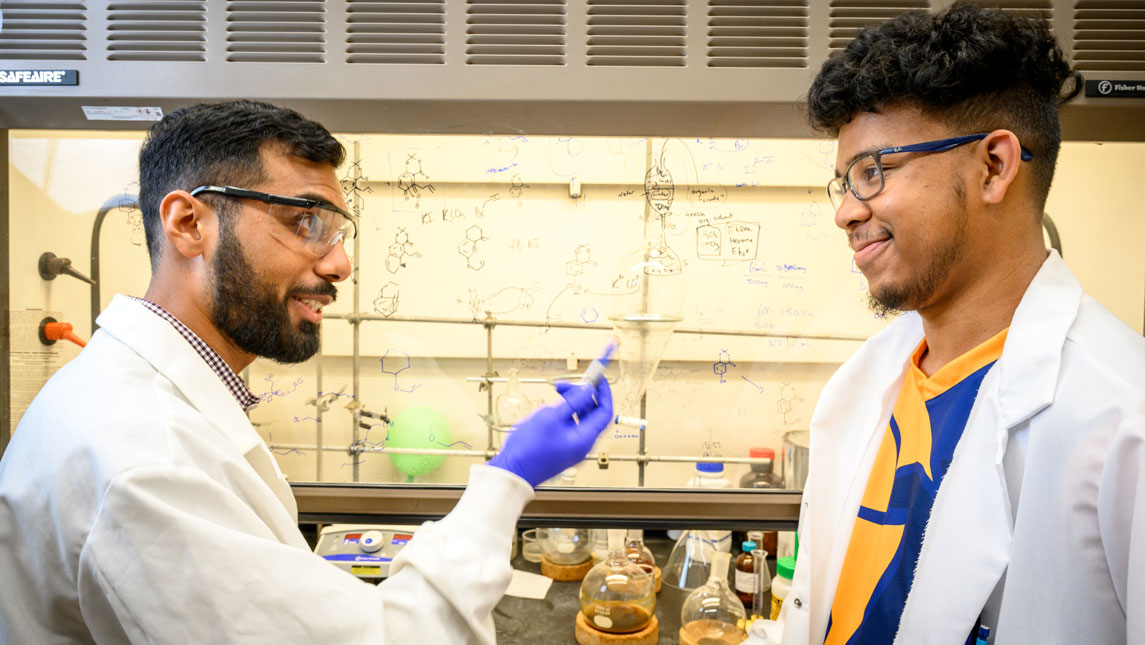
Harris Khan is a first-year master’s student in chemistry with a biochemistry concentration working on “The study of the internal base directed regioselective aromatic Claisen rearrangements.”
About the lab environment: “I really enjoy the fact that I have my own individualized project that I can make progress on. I know I’m often running reactions that might not work, but that’s okay, because the whole concept of research is trial- and error-based. The way that everyone in the group goes about their work while also having a fun time is amazing. Typically, while we’re running reactions, we have interesting conversations, so that helps us bond while also being on track for our research. Another plus is that anyone can ask for help from any other group member regarding their research and they usually get assistance right then. One other thing that makes the lab an enjoyable is the use of music. Sometimes, we play music on a speaker and all of the researchers go about doing their work while listening to a variety of genres of music.”
What’s your UNCG story? “I started my journey here at UNCG four years ago in 2018. I came as a freshman, majoring in biochemistry. I just knew that UNCG was the university that I was going to attend long before I started here as a student. My elder four siblings also went here and graduated with their degrees. Both my brothers went through the same department, and they were the ones who influenced me in taking up the biochemistry as my profession.”
Future plans: “To graduate with my MS degree. I would also try to get at least one publication before I graduate. After I graduate, I want to work in my field, specifically an industry job. All of that is possible with experience from the Croatt research group.”
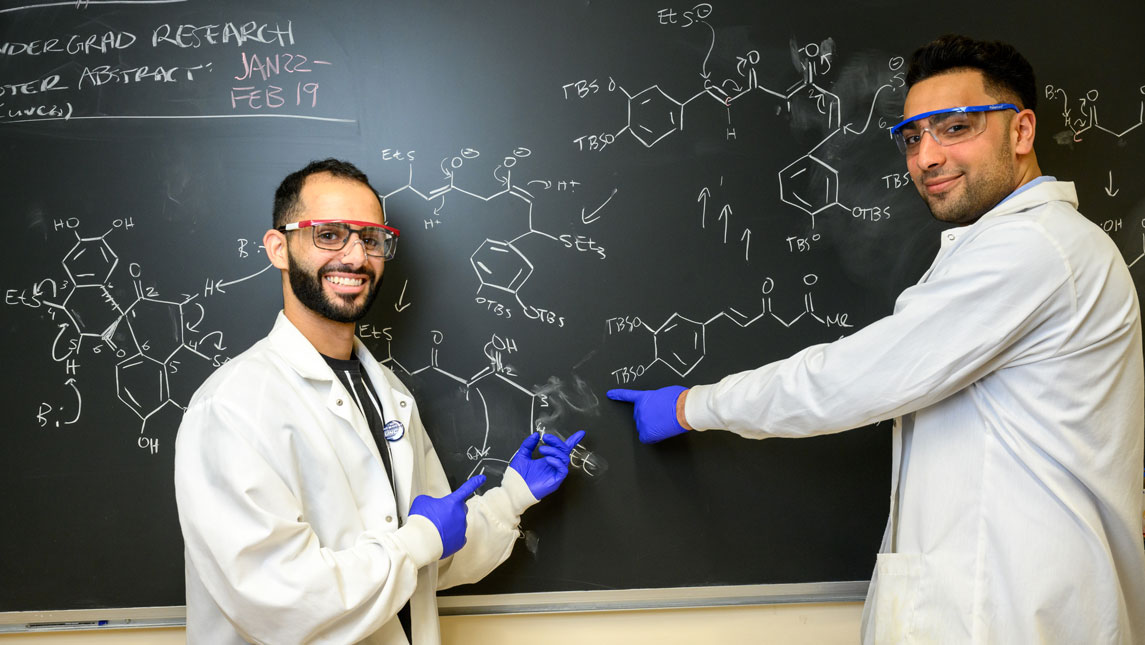
Abraham Ustoyev is a fifth-year PhD candidate in medicinal biochemistry with a synthetic organic chemistry focus. He currently holds a National Institutes of Health R15 Research Grant and is working on a project titled “Synthesis of Ambuic acid analogues as therapeutic agents for methicillin resistant Staphylococcus Aureus.”
About the lab environment: “What I love most about our lab is the camaraderie that we share amongst members in the group. There is an open and honest environment that allows us to be productive while also having fun. A lot of us consider the laboratory almost like our sanctuary.”
What’s your research like? “We take compounds, or molecules, found from plants and fungi that work to treat disease. Once something promising is found that has potential to become a drug, we as synthetic chemists try to make an ample amount of those compounds starting from cheap, readily available chemicals that serve as ‘building blocks,’ which ultimately serves to access these compounds in a much more efficient, cost-effective manner. You can think of constructing these compounds like a LEGO set, where certain chemical pieces come together to form the final compound that has the potential to cure a certain disease. The compound that we are specifically trying to make in our laboratory is called Ambuic acid, which is involved with treatment of bacterial infectionsm, including MRSA.”
What do you like about it? “I find it fascinating that mother nature provides the chemical scaffolds necessary to cure various diseases. Scientists scavenge these hidden treasures in plants and fungi from all over the world and find the active components, or natural products, in them that hold the power to treat certain disease states. Once a promising natural product is discovered, I love that we, as synthetic chemists, find ways to make an abundant amount of the natural product through efficient methods developed either in our laboratory or in other laboratories from around the world. It’s also exciting that we have the ability to synthetically change natural products to have them potentially work better than mother nature’s original creation. As a member of the Croatt lab, I am happy that I can apply my chemistry knowledge to help push science forward while also trying to improve the health and wellbeing of others.”
Future goals: “To continue drug design and discovery research at a Pharma company close to my hometown in New York. I am excited to apply the knowledge that I have gained here as a graduate student at UNC Greensboro to help advance the future medicinal chemistry.”
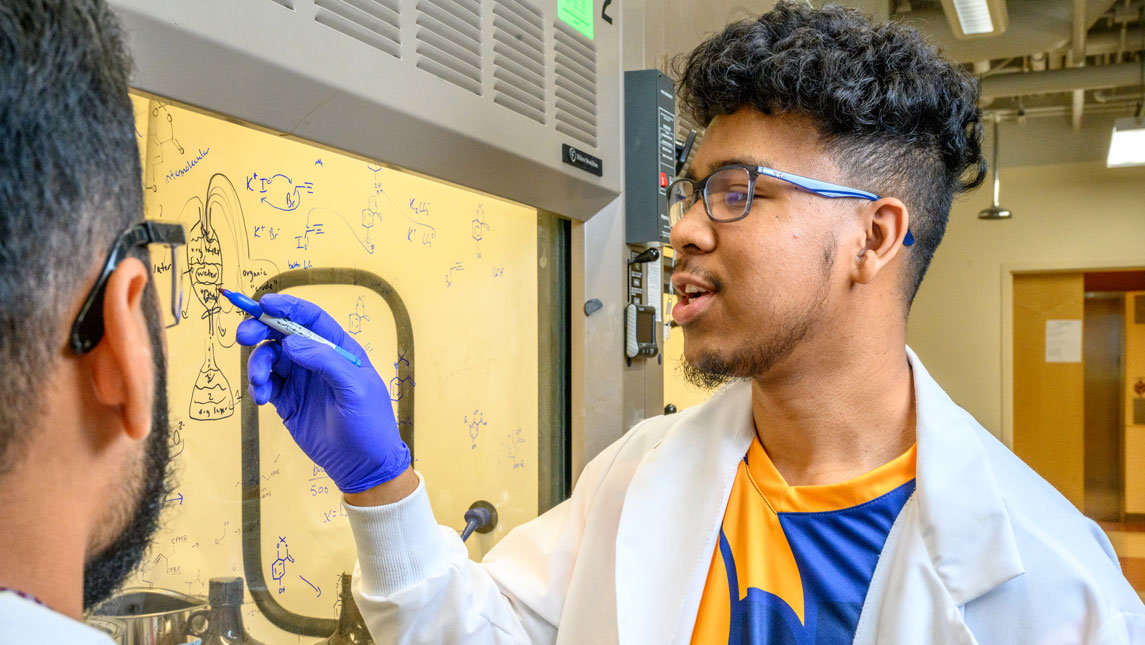
Logan Brown is a third-year biochemistry major, and MARC-U Star fellow, working with his peers on the Claisen Rearrangement project. He also plays saxophone in the UNCG Athletic Ensemble and is a member of the UNCG Rocket League Esports team
Tell me a story. “Abe and I often stay late in the lab running our experiments. The portion of this project that I was working on was thought to yield some exciting results. After running the experiment for eight hours and then three more hours in the microwave, we ran our analysis of the sample. I pulled up the file on my computer and started looking through it. I like to look through it myself first before asking the PhD students for help. After my own analysis, the exciting result that we were expecting was there.
I called Abe over and looked at him and said “Abe, you won’t believe it bro, we did it!” and he looked at me like “No way.” After he looked at it, he confirmed what I had suspected, and we were both shouting in excitement. This moment really stood out to me because it highlights that after putting in the hard work, the success at the end is always worth it.
I like to describe my research like cooking soup. In the lab, we combine different ingredients and mix them together at a high temperature to see what kind of “soup” we can make. (This also came from working with Abe.)”
Future plans: “I plan to go to graduate school to unlock my fullest potential in the scientific field. I currently have my eyes set on PhD programs that focus in biochemistry or chemical biology. I hope to get my PhD and work on anti-cancer drugs or genetic treatment for hereditary cancer.”
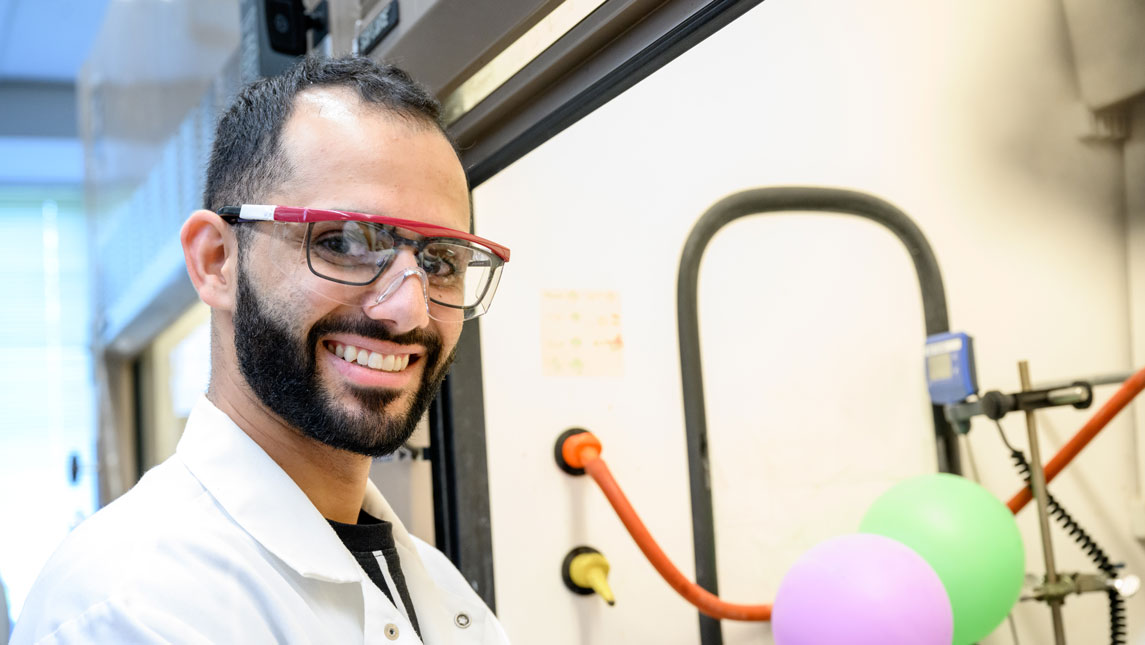
David Tanas is a first-year master’s student in biochemistry working on a project titled “Internal Base Directed Regioselective Aromatic Claisen Rearrangement.”
About the lab environment: “A fun moment in the lab was when I learned how to make spotters, which are very thin tubes of glass used to transfer very small amounts of liquid to a silica glass plate for what is called Thin Layer Chromatography (TLC). It was really cool to see, to take glass pipettes and hold them above a flame for a few seconds to melt the glass. Once the glass starts to droop, I stretched my arms as far as I could and as fast as I could, to make very thin tubes of glass, the spotters! It’s really cool to watch how they’re made, and even cooler to actually make them myself.
What do you love about your work? “Organic synthesis is great! I enjoy learning how to set up reactions and analyze products. This is my first year with the group so getting to learn the routine in the lab, and to get to know the group well has been really exciting. The group meeting is always fun. I enjoy working through problem sets, as they strengthen my organic chemistry knowledge. Dr. Croatt will send us to the board to work out some tricky steps, but it helps me personally to better my skills in organic chemistry and my knowledge for learning different reactions.”
Tell us your UNCG story, how you came here, who or what inspired you here: “As my undergraduate career at Appalachian State University came to an end, I wanted to continue the great work I’ve done in my undergraduate research in an organic lab. However, I worked with more analytical concepts and have been ever so eager to learn to work with wet chemistry and hands-on lab experience, to set up reactions and run them myself. I searched up graduate programs in North Carolina and found Dr. Croatt and his work fascinating. Seeing what he does motivated me to apply and come to UNCG, and I’ve enjoyed every single moment since!”
Future plans: “To work full-time in the lab this summer and continue my work that I started this past semester. After my master’s, I plan to go on for my PhD. I’d like to work in pharmaceuticals research, creating therapeutics for aiding human health.”
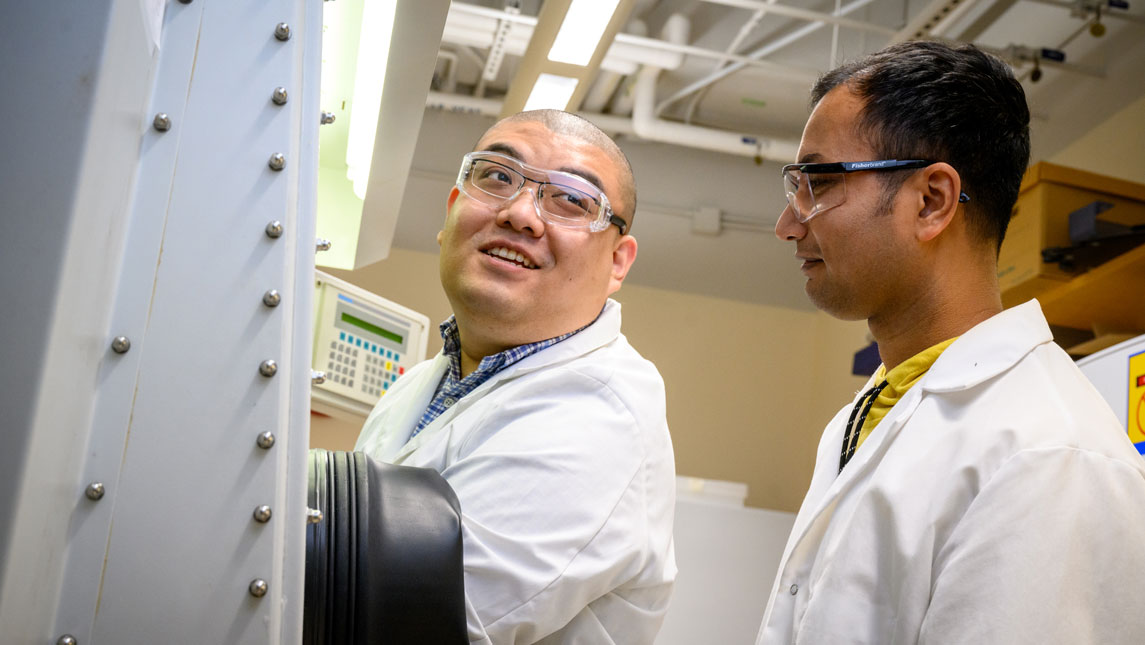
Tian Li is a fourth-year PhD student in medicinal biochemistry, working on a project titled “Semi-Synthesis of 5Z-7-Oxozeaenol and Hypothemycin Analogues for Tak-1 inhibition”
About the lab environment: “I enjoy the welcoming environment of the laboratory, and everyone’s willingness to collaborate and help each other. That’s what makes us a team.”
What are you working on? “For my research, I am currently working on a compound called hypothemycin, which is abundantly provided by nature, a species of fungus – and has an extraordinary ability to fight cancer. Our goal is to create variations, or analogues, of the compound to improve its ability to cure cancer. We do this by adding or removing chemical pieces to the compound, all while leaving the core pieces intact that are crucial to its potency as a potential drug candidate.”
Future plans: “Become a professor.”
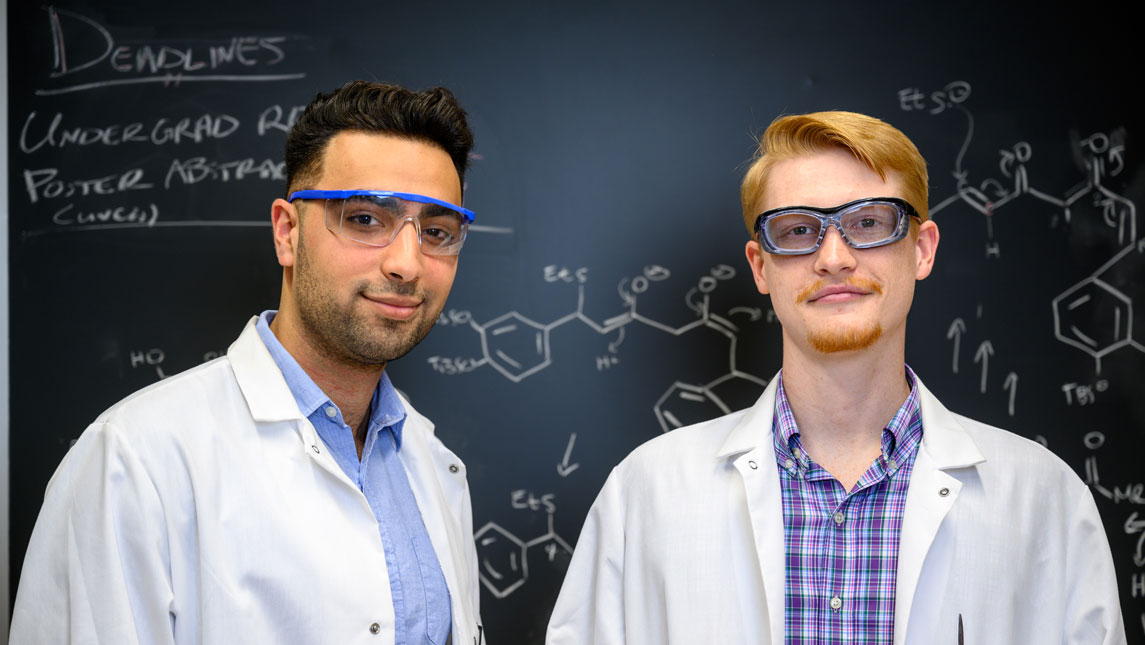
Philip West ’22 is a recent graduate from the Department of Chemistry and Biochemistry, and a Lloyd International Honors College alumnus.
What are you working on? “For the total synthesis project, what we are trying to do is to take very simple and cheap molecules, and through a library of chemical reactions, produce a very complex and expensive molecule. This molecule, ambuic acid, is a potential future drug for the treatment of MRSA due to its unique activity. For the Claisen project, we are trying to take a reaction that has been known for over 100 years and expand its utility in chemistry in a way that nobody has been successful in doing thus far. Additionally, we are fundamentally looking at how the reaction works through a different lens than anyone else has, in the hopes of learning more about it, and providing that knowledge to the community.
A memory about the lab? “One moment with my lab group I’ll never forget is one day in the summer when I went with some former group members to Pedro’s on Tate Street. We went there every Tuesday when we worked in the lab during the summer, because tacos were only a dollar on Tuesdays. We got into an argument about who could eat the most dollar-tacos, a debate I proudly settled with a second-place finish in the inaugural Croatt Lab Taco-Eating Contest.”
What else about the lab environment? “The passion that Dr Croatt has for chemistry and for teaching chemistry captivates me to this day and was immediately something I wanted to be a part of. I quickly learned, my sophomore year, that all of the faculty at UNCG share a similar level of passion for their work and for the pedagogy of their field, which further encouraged my participation on campus. Opportunities are everywhere at UNCG for those brave enough to take them. I love working in the lab and in academia, two places where I have met some amazing colleagues and mentors who have endlessly supported me in all my personal and professional endeavors.”
Future plans: “In August, I will be moving to Cambridge, Massachusetts, to begin the chemistry PhD program at the Massachusetts Institute of Technology (MIT), supported by the National Science Foundation (NSF) as a Graduate Research Fellow. There is simply no way I could be in this position without the opportunity, training, and support that was provided to me by Dr. Croatt and the Croatt Lab, who I will be sad to leave, but will be proud to represent in my career beyond UNCG.”
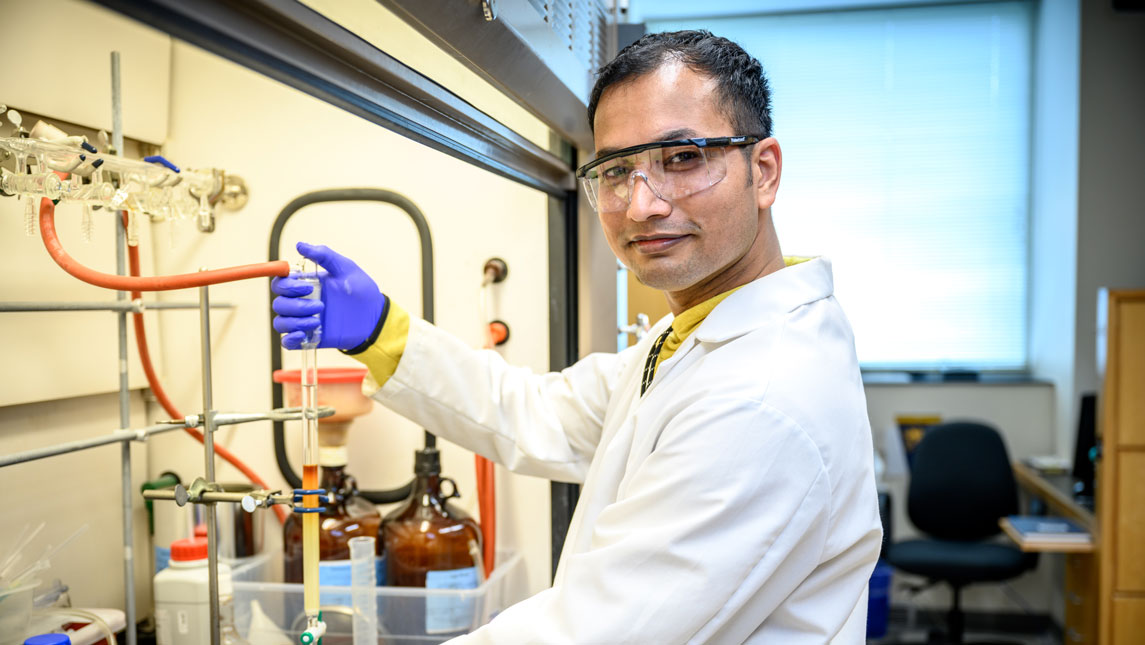
Khyarul Alam is a postdoctoral researcher in organic chemistry working on “Divergent Synthetic approaches for Heterocycles and bio-active molecules.”
The lab environment: “The thing I love about my work is that it helps me to grow up as an active and passionate person. Working in the field of chemistry is not an easy task, but collaborative research environments and cutting-edge instrumental facilities in the department makes it smooth. The exciting thing here is that all faculty, researchers, and students are so friendly and work together to accomplish the research objectives.”
Tell us your UNCG story: “I came to UNCG as a postdoc researcher in 2019 after completing my PhD in South Korea. When I interviewed for multiple postdoc positions at different universities, I found my current supervisor, Dr. Croatt, to be very grounded and friendly. Also, my research interests completely matched with his research activities within the group. So, I realized UNCG would be the right choice as a place to do something great as a researcher.”
Future plans: “My goal is to build a career in chemical industries or academia where I can use my teaching and research experiences. Over the next few years, I want to develop skills in research-based project management in the chemical or pharmaceuticals industry. I have always enjoyed leadership, so flourishing as a leader is one of my core career goals too.”
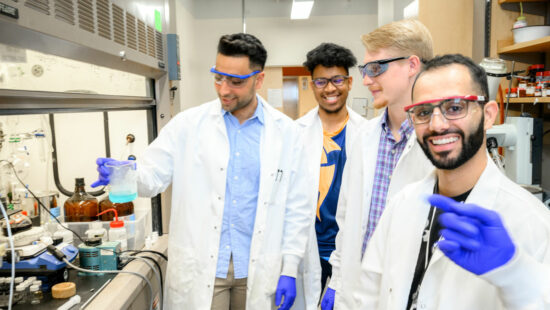
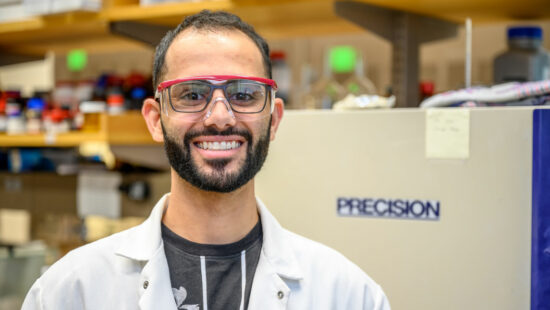
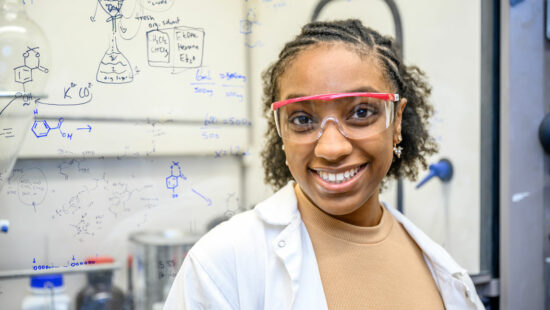
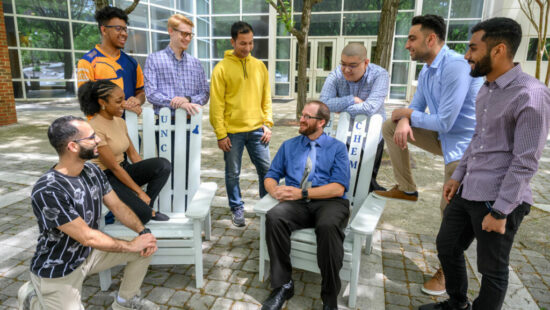
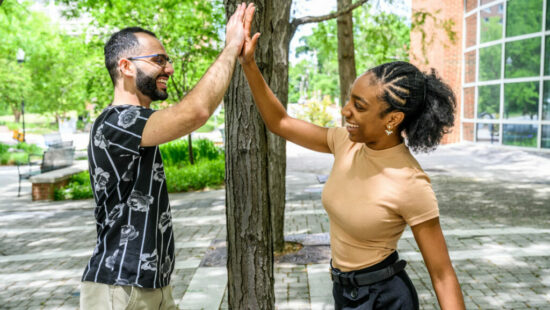
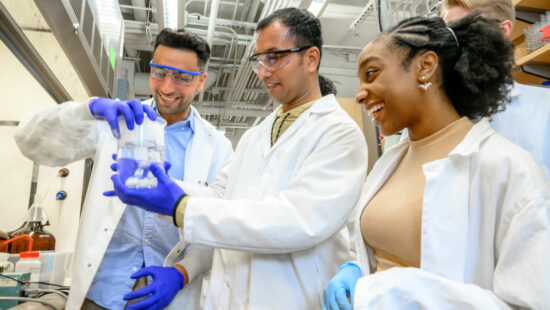
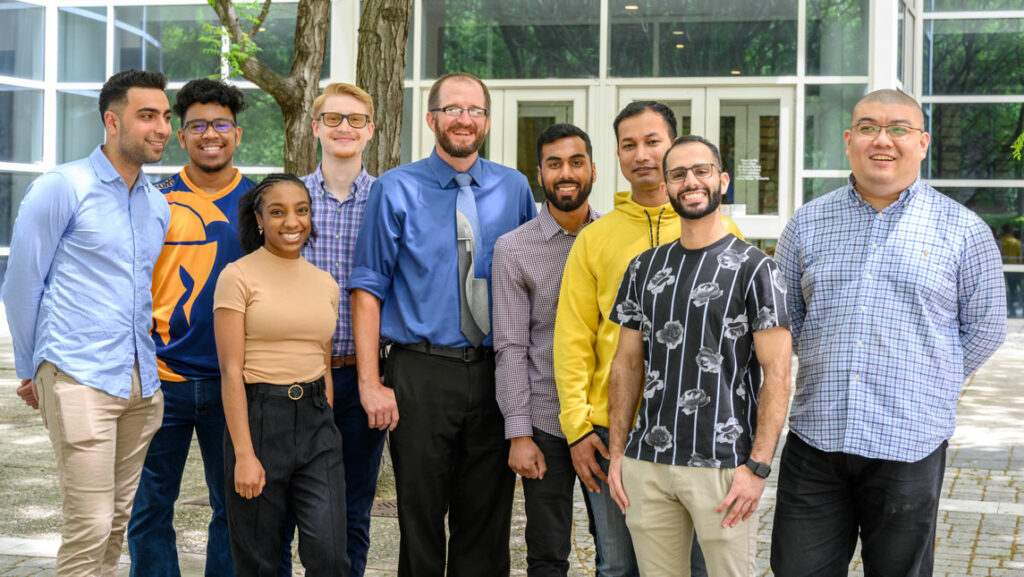
Interviews by Susan Kirby-Smith, University Communications
Photography by Martin W. Kane, University Communications
